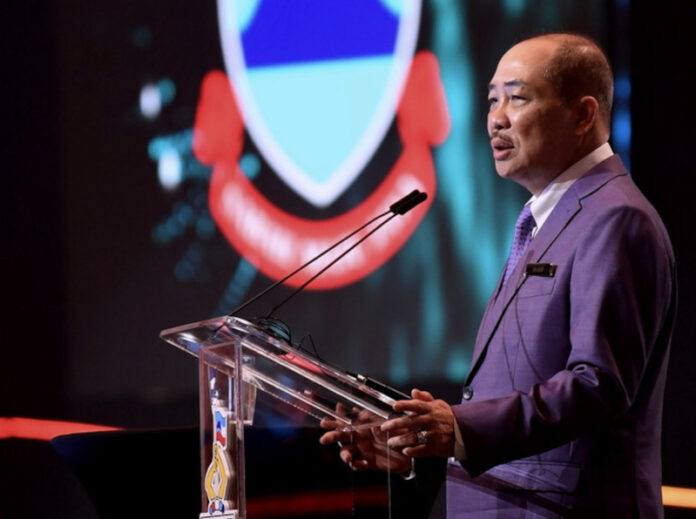On Friday, Sabah Chief Minister Datuk Seri Hajiji Noor said that the ‘identity card’ proposal was still at the discussion stage and no final decision had been made. — Bernama pic
KOTA KINABALU, Feb 13 — Long-residing foreign nationals in Sabah said they are sceptical about the government’s proposal to issue an “identity card” to them, with many saying they would need to think long and hard before signing up for such a scheme.
Their biggest concern is the repercussions and consequences of authorities knowing their details for fear of laying bare their vulnerability to the system.
Manjung, an odd-job worker originally from Zamboanga in the Philippines, looked disinterested when first told about the proposal to register foreigners in the state and give them official documentation.
“What for?” was his reply before saying that he would not voluntarily give up his personal details for no apparent benefit.
The 42-year-old has resided in Sabah since he was a child, and now has three children of his own. They share a rented room in the city where his wife works as a cleaner.
The family have lived most of their lives in Sabah, moving between Tawau and the state capital, without proper documents — meaning they could not attend school, buy property, get bank loans or operate legitimate businesses.
But even then, to Manjung, an “identity card” would be more detrimental than useful unless the government was transparent about how it plans to use the card, and even then, he is doubtful of the intentions.
“Can they promise not to take action against anyone? Can they promise they will not deport me? No one will believe them anyway unless it is proven that they won’t,” he said.
On Thursday, Home Minister Datuk Seri Hamzah Zainudin said the government will act on a proposal by the Sabah government for a special card to be created and issued to foreign nationals who have been residing in the state, as well as to their children.
He said the card would be issued on “humanitarian grounds”, and enable the authorities to ascertain the number of foreign nationals present in the state.
He was ostensibly referring to the extensive undocumented community in Sabah, many from Southern Philippines, who have for various reasons, migrated to Sabah and stayed for generations without ever obtaining proper documentation.
They are caught in a loophole as the Philippine government also does not recognise them as citizens after generations of being here. The issues are wide ranging, but over the years, some may have obtained citizenship either through dubious or legitimate means, but most still fall between the cracks.
Hamzah said that the government was considering issuing the “identity card” within the next three months.
He added that while it would not grant citizenship, the card would allow those holding one to apply for jobs.
Dina, a stall operator in the city whose family has been here since she was six years old, said that it may be a solution to their statelessness issue, but still expressed uncertainty when informed of the proposal.
“They have done this before, but it doesn’t amount to anything. I am doing OK now without it. Unless there is a very good reason to, I really don’t know,” she said, shrugging her shoulders.
When told that such documentation may allow her or her children to seek proper jobs, she conceded it would be a game changer for her children’s future, but indicated a lack of trust in the process.
“What’s stopping them from changing their minds one day and coming after us?” she said.
“We have been here for so long, I cannot take the risk,” she added.
However, there are also foreigners like Matzain Mohamad who was born here and feels secure enough in his status that he thinks it might be a good idea in order to give his family a better life.
The 50-year-old fisherman, who has grandchildren now, said that it was time to make the community “legal” in the eyes of the government.
“I have lived here all my life and settled down here. I have done everything that I can to try and get some status, but it has been one obstacle after another. I do not want my grandchildren to carry on like this.
“Hopefully, they do it properly and with good intentions. There are many of us who just want to live a normal life,” he said.
On Friday, Sabah Chief Minister Datuk Seri Hajiji Noor said that the “identity card” proposal was still at the discussion stage and no final decision had been made.
“The GRS state government takes note of all the views and input from all quarters following the statement by the home minister. It is better for all not to jump the gun,” he said.
Hajiji added that the proposal does not involve giving foreigners identification cards or documents to grant them citizenship and that it will need to be fine-tuned by taking into account the views and inputs of political parties, activists and the people, among others.
The proposal is receiving flak for being similar to a Temporary Pass (PSS) that was mooted during the Pakatan Harapan and Warisan administration which the current government had objected to.
Claims of the PSS being the first step to granting undocumented migrants citizenship was reported to be a factor that had caused the Warisan state government to lose the Kimanis by-election in 2020.


